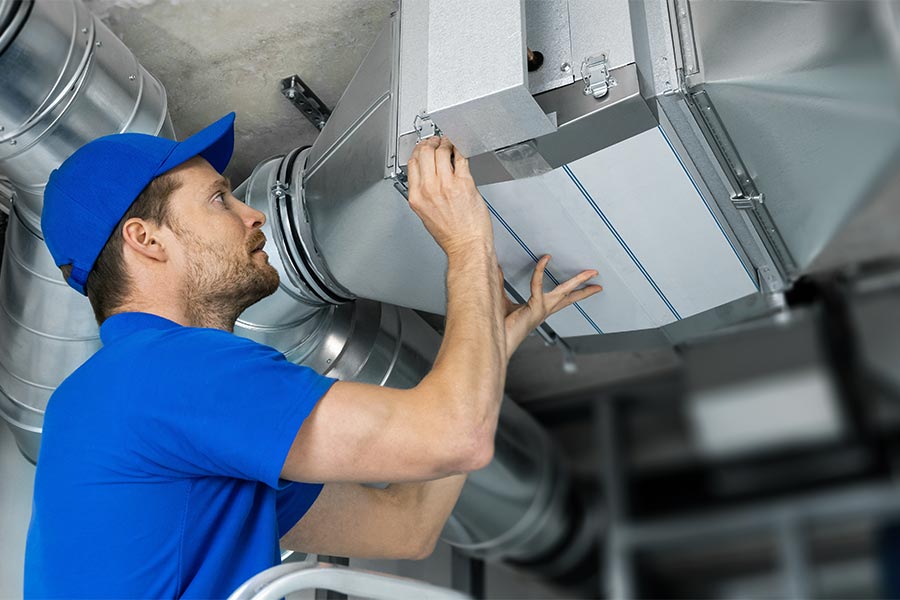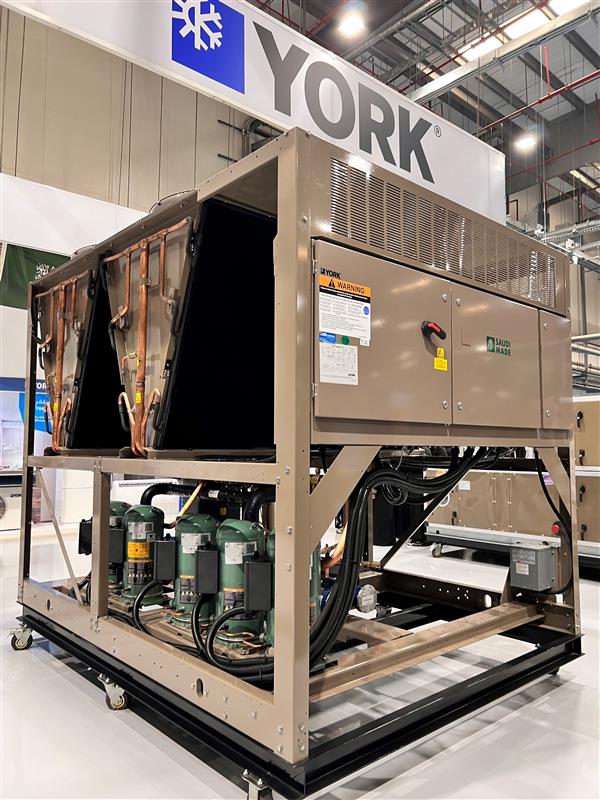How a Dependable Heating And Cooling System Boosts Indoor Air Top Quality and Comfort
A trustworthy cooling and heating system is crucial for maintaining indoor air quality and convenience. It manages temperature and humidity, developing a healthier living setting. Effective air purification eliminates toxins and irritants, while correct humidity degrees avoid mold development. Regular upkeep warranties peak efficiency, boosting system performance. Comprehending these parts discloses just how they engage to produce a fresh environment. Nonetheless, the partnership in between cooling and heating systems and overall well-being goes deeper than one might anticipate.
Understanding the Essentials of Heating And Cooling Solutions
Heating and cooling systems, basic for modern-day comfort, include heating, air, and air flow conditioning components that interact to control interior settings. These systems are developed to preserve optimal temperatures, making sure that rooms remain comfortable no matter of external weather. Burner, such as furnaces or heatpump, provide heat during chillier months, while cooling systems cool down spaces when temperatures climb.
Air flow plays an essential role, promoting the flow of fresh air and getting rid of stale air, which helps in preserving a well balanced atmosphere. Various kinds of a/c systems exist, including systematized and decentralized configurations, each fit for different structure sizes and purposes. Furthermore, modern-day improvements have actually presented wise technologies, permitting boosted control over indoor climate. Recognizing these fundamentals enables individuals to value how a/c systems add to total health and convenience in property and business areas alike, preparing for conversations on their influence on interior air top quality.
The Role of Air Filtration in Indoor Air Quality
A significant element of keeping interior air high quality is efficient air filtering, which plays an important duty in removing toxins and irritants from the setting. HVAC systems equipped with top quality filters can record a variety of pollutants, including dirt, plant pollen, family pet dander, and mold and mildew spores. This purification procedure significantly decreases the focus of airborne bits, leading to a cleaner and much healthier indoor atmosphere.
Routine maintenance of air filters is important to assure peak efficiency. Obstructed or unclean filters can impede airflow, lowering the system's effectiveness and potentially permitting pollutants to distribute within the area. By changing or cleaning filters as recommended, homeowners can boost their cooling and heating system's capability to provide fresh air.
Humidity Control and Its Influence On Comfort
While many may focus on temperature guideline, humidity control is just as essential for keeping comfort in interior settings. High humidity levels can lead to discomfort, making spaces really feel warmer than they actually are, while reduced moisture can cause dryness, irritation, and boosted susceptibility to breathing problems. A reliable cooling and heating system plays a substantial duty in managing interior humidity, ensuring that air is neither as well wet nor also completely dry.
Ideal humidity degrees usually vary from 30% to 50%, advertising a comfy atmosphere. When humidity is well-regulated, occupants experience enhanced thermal convenience, boosted indoor air top quality, and lowered dangers of mold and mildew growth and dust mite expansion. In addition, proper humidity control can protect furniture and structural aspects from damage triggered by extreme wetness or dry skin. As a result, integrating effective moisture monitoring right into HVAC systems is vital for promoting a pleasurable and healthy and balanced indoor environment for well-being and performance.
The Value of Routine Maintenance
Normal maintenance of cooling and heating systems is necessary for making certain peak efficiency and durability. This proactive method not only decreases prospective malfunctions yet likewise boosts energy performance, which can result in substantial expense savings with time. Scheduled inspections allow service technicians to identify and resolve problems before they escalate into pricey repair work, making sure the system operates efficiently.
In addition, regular maintenance entails cleaning or changing filters, checking refrigerant degrees, and inspecting air ducts, every one of which contribute to ideal air flow and system efficiency. By keeping the cooling and heating system, house owners can additionally prevent extreme deterioration on parts, expanding the general life-span of the device.
A well-kept Cooling and heating system operates quietly and securely, minimizing the danger of hazardous scenarios. In verdict, normal maintenance is a critical investment in both the performance of a/c systems and the convenience of interior environments, eventually promoting a healthier living area.

Exactly How HVAC Solution Reduce Allergens and Pollutants
Efficient a/c systems play an essential function in decreasing allergens and pollutants within interior settings, thereby boosting total air top quality. These systems make use of innovative filtering innovations that catch dust, plant pollen, mold and mildew spores, and animal dander, preventing them from flowing throughout the living room. High-efficiency particulate air (HEPA) filters are especially effective, capturing as much as 99.97% of bits as tiny as 0.3 microns.

Energy Performance and Its Advantages for Health
Energy-efficient HVAC systems not just decrease power consumption yet also have significant health benefits for owners. By enhancing power use, these systems can preserve regular indoor temperatures, which aids prevent the development of mold and mildew and mold. Managing humidity degrees is crucial for breathing wellness, as excess moisture can worsen allergic reactions and asthma. Furthermore, energy-efficient systems often incorporate advanced purification technologies that enhance air high quality by eliminating airborne particles and pollutants, better enhancing general health.
Reduced energy consumption implies lowered emissions from power plants, adding to cleaner outdoor air quality, which indirectly sustains the health of citizens. With a concentrate on sustainability, energy-efficient heating and cooling systems advertise a much healthier living atmosphere. By purchasing such systems, homeowners not just save on energy costs yet likewise make a significant dedication to the health of their communities and families. Eventually, power performance in cooling and heating systems cultivates a healthier indoor ambience for all.
Enhancing Convenience With Smart Modern Technology Integration
As wise innovation proceeds to advance, its integration into a/c systems significantly enhances interior comfort. Smart thermostats, as an example, enable customers to customize heating and cooling timetables based upon their day-to-day regimens, guaranteeing excellent temperatures when individuals are home. These tools can learn choices gradually, adjusting setups immediately for maximum comfort.
In addition, wise sensing units check indoor air top quality and humidity degrees, providing real-time feedback that assists maintain a healthy and balanced atmosphere. By interacting with heating and cooling devices, these sensing units can trigger adjustments to air movement and temperature level, making certain consistent comfort.
Mobile applications additional equip individuals, enabling push-button control of a/c settings from anywhere, therefore supplying ease and adaptability.
Regularly Asked Concerns

How Can I Tell if My Cooling And Heating System Is Efficient?
To figure out cooling and heating efficiency, one can examine power bills home for anomalies, inspect for uncommon noises, screen temperature uniformity, assurance proper air movement, and routine regular maintenance. These factors jointly indicate the system's functional effectiveness and effectiveness.
What Signs Suggest Poor Indoor Air Top Quality?
Indicators of inadequate interior air top quality consist of persistent odors, excessive dust accumulation, raised allergy signs, visible mold growth, and varying humidity degrees. These signs usually suggest that air flow or air filtration systems might be inadequate or malfunctioning.
Can a HVAC System Aid With Pet Dander?

Just how Commonly Should I Change My Air Filters?
Air have a peek here filters need to usually be changed every 1 to 3 months, depending on usage and interior air high quality. HVAC experts. Routine replacement assists keep effective air flow and decreases dust, irritants, and other particles in the home atmosphere
What Are the Costs of A/c System Setup?
The costs of a/c system installment commonly range from $3,000 to $7,000, depending on variables such as system kind, home size, and neighborhood labor prices. Additional functions may raise total expenses significantly.
A reliable Heating and cooling system is vital for preserving interior air quality and convenience. A/c systems, fundamental for modern convenience, include ventilation, air, and heating conditioning elements that work with each other to manage indoor atmospheres. Effective HVAC systems play an important role in lowering allergens and contaminants within indoor settings, thus enhancing total air quality. An A/c system can substantially reduce animal dander by using innovative filtering systems and routine maintenance (HVAC experts). The expenses of Heating and cooling system setup normally vary from $3,000 to $7,000, depending on aspects such as system type, home dimension, and neighborhood labor prices